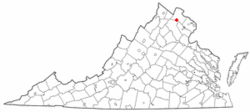Middleburg, Virginia
| Middleburg, Virginia | |
|---|---|
| Town | |
| Town of Middleburg | |

Aerial view of Middleburg
|
|
| Motto: "Semel et Semper" | |
 |
|
| Coordinates: 38°58′6″N 77°44′15″W / 38.96833°N 77.73750°WCoordinates: 38°58′6″N 77°44′15″W / 38.96833°N 77.73750°W | |
| Country | |
| State |
|
| County |
|
| Government | |
| • Mayor | Betsy Davis |
| Area | |
| • Total | 1.5 km2 (0.6 sq mi) |
| • Land | 1.5 km2 (0.6 sq mi) |
| • Water | 0.0 km2 (0.0 sq mi) |
| Elevation | 148 m (486 ft) |
| Population (2000) | |
| • Total | 632 |
| • Density | 420.7/km2 (1,083.3/sq mi) |
| Time zone | Eastern Time Zone (ET) (UTC-5) |
| • Summer (DST) | EDT (UTC-4) |
| ZIP codes | 20117–20118 |
| Area code(s) | 540 |
| FIPS code | 51-51448 |
| GNIS feature ID | 1470422 |
| Website | www.middleburg.org |
Middleburg is a town in Loudoun County, Virginia, United States. The population was 632 at the 2000 census.
The town was established in 1787 by American Revolutionary War Lieutenant Colonel and Virginia , Leven Powell. He purchased the land for Middleburg at $2.50 per acre in 1763 from Joseph Chinn, a first cousin of George Washington. It had been called "Chinn's Crossroads", and was then called Powell Town. When Leven Powell declined to have the town named after him, the town was called Middleburgh, and later, simply Middleburg. The village is located midway between the port of Alexandria and Winchester, Virginia, on the Ashby Gap trading route (now followed by U.S. Route 50).
In 1863, Middleburg witnessed two skirmishes during the Gettysburg Campaign of the Civil War.
From the early 1900s, Middleburg began welcoming visitors who participated in foxhunting and steeplechasing. The village soon earned a reputation as the "Nation's Horse and Hunt Capital", attracting prominent visitors from across the U.S. Middleburg is the home of the 15,000-square-foot (1,400 m2) National Sporting Library research center for horse and field sports, which publishes Thoroughbred Heritage on the Internet. A new addition is being made to include an art gallery and museum.
In 1961, civil rights activists pressed John F. Kennedy on local segregation issues during his residency outside town.
...
Wikipedia
